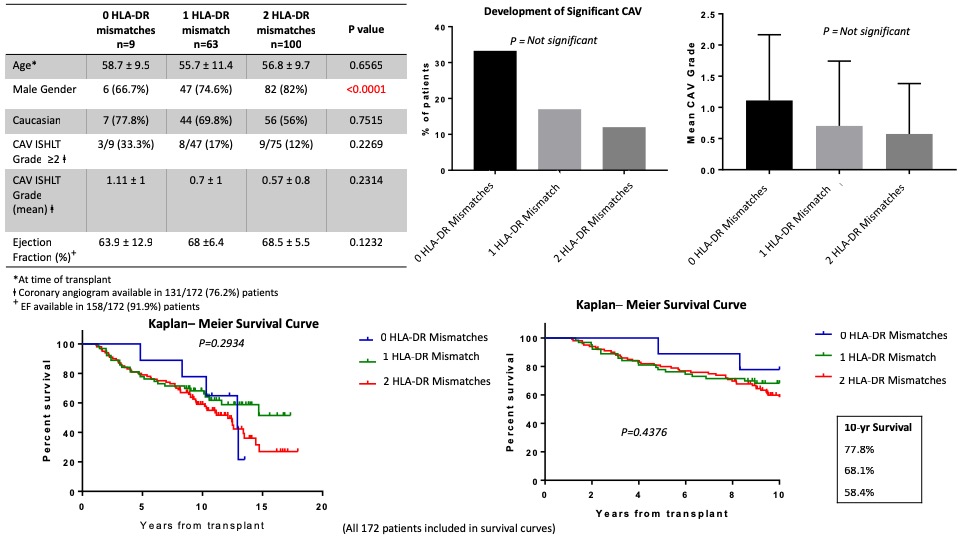Influence Of HLA-DR Mismatches On Long Term Outcomes Following Heart Transplantation
Division of Cardiology/ JC Walter Jr. Transplant Center, Houston Methodist Hospital, Houston, TX
Meeting: 2019 American Transplant Congress
Abstract number: B99
Keywords: Heart transplant patients, HLA matching, HLA-DR antigens, Survival
Session Information
Session Name: Poster Session B: Heart and VADs: All Topics
Session Type: Poster Session
Date: Sunday, June 2, 2019
Session Time: 6:00pm-7:00pm
 Presentation Time: 6:00pm-7:00pm
Presentation Time: 6:00pm-7:00pm
Location: Hall C & D
*Purpose: In the field of kidney transplantation, there is strong support for the beneficial effect of minimizing donor-recipient HLA incompatibility, and HLA-DR matching in particular contributes the most to graft survival and function. However, there are conflicting reports on the effect of donor-recipient HLA-DR matching on outcomes in heart transplantation. A few studies have shown HLA-DR matching reduces the incidence of graft rejection within the first year and increases short term graft survival. It is not known if HLA-DR matching impacts long term outcomes. We sought to analyze the effect of HLA-DR mismatches on long term survival, and also explain possible mechanisms for its impact on survival.
*Methods: All adult heart transplantations performed at our institution from 2000 to 2010 were retrospectively reviewed. Multi-organ transplant recipients, patients who expired within the first year after transplantation and those with missing data were excluded. Patients were grouped according to the number of HLA-DR mismatches: 0, 1 or 2. We analyzed allograft function [using the most recent ejection fraction (EF)], development of angiographically significant (ISHLT grade >2) cardiac allograft vasculopathy (CAV) and survival in these groups. ANOVA was used for analysis. Kaplan-Meier survival curves were generated. P value <0.05 considered significant.
*Results: A total of 172 heart transplant recipients were included in the analysis. HLA-DR mismatch status was as follows: 9 (5.2%) had 0, 63 (36.6%) had 1, and 100 (58.1%) had 2 mismatches. There were more men in the group with 2 mismatches (82% vs 74.6% vs 66.7%, P<0.0001).There was no difference in the development of significant CAV in the three groups (33.3% vs 17% vs 12%, P=0.23). There was no difference in the severity of CAV (mean ISHLT grade 1.11+1 vs 0.7+1 vs 0.57+0.8, P=0.23). Mean EF was also no different between the three groups (63.9+12.9% vs 68+6.4% vs 68.5+5.5%, P=0.12). Survival to 10 years was similar in the three groups (77.8% vs 68.1% vs 58.4%, P=0.44).
*Conclusions: In our cohort, HLA-DR mismatches did not affect graft function, as assessed by EF, development and severity of angiographically significant CAV. There was no impact on long term patient survival. Therefore, HLA-DR matching prior to heart transplantation may not be justified given the increased cost, logistical burden of HLA matching and the longer cold‐ischemic times that may result from reliance on tissue typing.
To cite this abstract in AMA style:
Singhvi A, Araujo-Gutierrez R, Park MH, Bhimaraj A, Trachtenberg BH, Hussain I, Guha A. Influence Of HLA-DR Mismatches On Long Term Outcomes Following Heart Transplantation [abstract]. Am J Transplant. 2019; 19 (suppl 3). https://atcmeetingabstracts.com/abstract/influence-of-hla-dr-mismatches-on-long-term-outcomes-following-heart-transplantation/. Accessed February 23, 2026.« Back to 2019 American Transplant Congress

